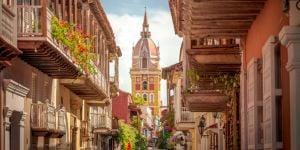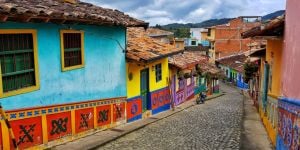Tips and advice to thrive in Colombia
Last activity 14 March 2016 by herbw53
1700 Views
9 replies
Subscribe to the topic
Post new topic
Hi,
When living in a foreign country, you have to adapt to a new environment, various cultures and different social codes.
How did you manage to adjust to Colombia?
How long does it take to feel at home? Would you say it is an easy process?
According to you, what is key for a successful integration process in Colombia?
Thank you in advance for sharing your experience!
Priscilla
As with living in any foreign country, knowing or learning the native language is probably the first key to success. In the case of living in Colombia, there are some Colombians who speak English, but not that many and most of the ones who do, don't speak with fluency. It has always been my thought that if I am a guest in another country it is my responsibility to adapt as well as try to learn and speak the language.
The visa rules in Colombia are probably the next area of knowledge required. If you want to visit as a tourist for up to 90 days at a time, you can do so by simply entering the country with a valid passport from the United States. Technically you can visit for 90 days twice per calendar year and then would not be allowed to visit again for 180 days. However, if you schedule your second visit during the last three months of the year, you can start the 90 visit schedule again after January 1st.
In my case since I am retired, I opted to apply for a pensioner's visa. This was simply a matter of showing evidence of sufficient income and filling out the necessary documents. There are English speaking fee based companies that will help you with the process and the cost depends on how much of the work you want them to do for you.
My initial apprehension about living in Colombia, after deciding to check out Medellin, was the issue of safety. Because of the past history of narco-violence in Colombia, I wasn't sure it would be a safe place to visit or live. My initial worries have proven to be misinformed. For the past 10 years in particular, Medellin has transformed itself into a vibrant and safe city. As with any city of 3.5 million people, there is the potential for property crime and robbery, but if you don't make yourself a target, you are very safe. Obviously if one finds oneself in the unfortunate situation of being robbed at gunpoint or knifepoint it is best to surrender your valuables and live to see another day. This advice is valid in Chicago, New York, Boston, Cleveland, etc. So, if a non-Colombian uses common sense, the city is very safe.
The variety of food and entertainment options in Medellin are vast. There are many typical Colombian restaurants, but there are also Italian, Peruvian, Vietnamese and French restaurants and others to choose from. For entertainment, there are amazing shopping malls with movie theatres and clothing stores, etc. If you are interested in live music possibilities there are many bars and restaurants featuring Latin music, American Rock and Roll, and there are many places to dance salsa and other Latin dances.
The climate in Medellin, where I have chosen to live, is very constant. The city has the nickname of "The City of Eternal Spring" with good reason. The daytime temperatures usually vary between 70 and 85 degrees Fahrenheit. Air conditioning is rare and typically not needed. With windows open and a small fan, sleeping is comfortable. During the day, if you are in the sun it can seem hot, but if you move into the shade, you will be comfortable almost at once.
Fresh fruits and vegetables are plentiful and inexpensive. In fact, the cost of living in Medellin is in general very inexpensive. If you enjoy flowers and plants, Medellin is about as beautiful with abundant flowers and plants as anyplace you could visit.
There are some negatives to living in Colombia, but they are similar to negatives of living anywhere else outside of the United States or much of Europe. Other than taxis and people on motorcycles, the pace of living here is not that fast. Be prepared to be more patient to get things done here. Mostly it is the little things, like when ordering food when with a group of people, don't be surprised if the server doesn't bring each person's order at the same time. Lines for banking and other business transactions can be long, but this is not necessarily the case.
Renting an apartment may require a fiador (Colombian guarantor) or a deposit of several months rent. But rents are relatively inexpensive in Medellin compared to the United States. Rents vary from neighborhood to neighborhood. Rents in Poblado and Envigado for example tend to be on the higher end of the rent spectrum. These are the wealthier areas. Laureles is another area where rents are, while not as high as the previous areas, are higher than some less desirable areas. However, Laureles is for me a much more active neighborhood during the daytime. In all of Medellin there are many parks with sporting activities and free exercise equipment for public use.
Public transportation is second to none here. Taxis are very inexpensive and you can get just about anywhere for from $1.50 - $6.00 USD. The metro system is clean and efficient with a cable car system that takes you to almost any area of the city you need to go. They have a cable car system for the people who live in the mountains around the valley to get back and forth to work in the city.
Colombia is the largest producer of fresh cut flowers in the Americas. And the annual Flower Festival the end of August and first of September is a 10 day party of music and entertainment culminating in a massive parade.
Christmas festivities begin the last night of November with fireworks being displayed all over the valley. It is something to see. And of course the Christmas lights are plentiful and amazing to see. And last but not least, the people of Colombia are very friendly, helpful and pleasant. Even if you don't speak very good Spanish, they are patient and understanding.
Richard Murray
Very nice narrative. My husband and I have decided to move to Manizales next summer (early retirement). I wonder if you have visited Manizales before deciding to stay in Medellin?
I haven't visited Manizales yet, but plan to this spring. I've heard great things about it though.
Richard, that was a great post and right on the mark. Like you, I am retired but, I live in a small town not very far from the international airport, that service Medellin.
I've lived in Colombia now for nearly ten years now and am married to a Colombian lady. When I first arrived in Rionegro, which is very near Medellin, I spoke almost no Spanish. However, armed with my handy English/Spanish dictionary, I managed to meet a lot of very friendly and helpful. The mere fact I was trying to communicate in Spanish seemed to spark an extra level of helpfulness from the people I encountered.
I am now a naturalized Colombian citizen (nacionalidad colombiana), which means I no longer have to renew my visa every five years. That's a big relief because, to do so means a few trips to Medellin to visit "migracion". Not that it's a traumatic experience but, it's just one less line to wait in. When I got my first resident visa, I used one of the many service companies Richard mentioned. I would highly recommend anyone wishing to migrate to Colombia do the same. It made things much easier.
As I mentioned above, I live in a small town, La Ceja, which is in what is referred to as the "orient" zone of Antioquia. I do have family (adult children) back in the USA and, since they haven't visited to see for themselves, they have the unfounded opinion that Colombia is a backward third world country. Nothing could be further from the truth. Even living in this small town, the quality of goods, foods, and services are of high quality and we're able to find most of the things we want. The few things we are unable to find here, we find easily in Rionegro, which is about a 20 drive, or 25 minute bus ride away (local and inter-city public transportation is abundant and reliable, even in small towns).
In my ten years living here, I've received many ominous emails from the US Embassy, warning of the many dangers of traveling in and around small towns. Frankly, my personal experience is, these small towns are very safe and the people, especially the farmers (campasinas), to be even more willing to offer assistance, than in the big city. Example - last week we experienced some car trouble and it seemed like every other car that came by, would stop and ask of they could help. Now, I'm know there are some areas of the countries, where you wouldn't be safe. But, those places are the slums of the big cities and areas near the Venezuelan border.
From experience, I can tell you, likely the most dangerous thing about Colombia are the motorcyclists. They have no respect for even the most basic rules of the road. They will pass you on the right (even when you have your turn signal flashing), cut in front of you and slow down abruptly, and cut you off at intersections. I can't tell you how many young people I've seen killed or lose their legs in accidents. So, if you plan to drive in Colombia, be very watchful for them.
BTW, almost everything is less expensive here in Colombia, except cars. Cars are very expensive and you CANNOT import your car from back home, unless you are an employee of the embassy. Housing is particularly inexpensive, except in guard gated communities, where prices are similar to housing prices in the USA. However, if you're planning to buy a house or apartment in Colombia, in most cases you'll have to pay cash. Mortgages are not common and not available at all for houses more than 12 years old.
Well, that's my two pesos worth. Bienvenidos a Colombia!
Merrill Kingston
Oh awesome! After deep research we chose it as our destination. Hopefully we like it! We currently live in Houston Texas (16 yrs now) but are Argentinian.
Nice post. Any words on Manizales? We plan to retire thete next summer! Have not been to Colombia yet. Currently in Hoyston Texas (for 16 yrs), but have lived in different countries of South America and we are Argentinian. Thanks!
I have lived in Colombia for about ten years now, though in a small pueblo in El Valle and though I love Colombia the motorcycle thing used to drive me crazy. Turn your right signal on and the motorcycles and sometimes cars, try to pass on the right, left signal, they all try passing on the left. Finally I asked what was up, and the person said that in the small pueblos the directionals are used as a courtesy like waving people by. On the highway and in the city though it is not that way. So in the pueblos I refuse to use the directional. As using them has caused several motorcycles and one car to have accidents, trying to avoid hitting me when I was turning and they were trying to pass. Hopefully this bit of info helps.
My wife is from Colombia so it has been an fairly easy process. The mots difficult part for me so far is learning Spanish. Colombia is not like Costa Rica where 40% of the population speak English. However people in Colombia are usually very patient and helpful and will usually go out of their way trying to understand you. As far as the different culture goes, simply treat the people you meet with the same kindness and respect that you yourself want to be treated and the rest will take care of itself.
Articles to help you in your expat project in Colombia
 How to drive in Colombia
How to drive in ColombiaAny foreigner entering Colombia on a tourist visa is permitted to drive with the valid driver licence from their ...
 Leisure activities in Colombia
Leisure activities in ColombiaBoth visitors and those who stay long term in Colombia will have no shortage of things to do. Colombia's rich ...
 Phones and internet in Colombia
Phones and internet in ColombiaKeeping in touch with friends and family is a top concern no matter where you are living. In order to stay in ...
 The healthcare system in Colombia
The healthcare system in ColombiaHealthcare is a primary concern for anyone moving abroad and future expats will be happy to learn about the ...
 The Working Holiday Visa for Colombia
The Working Holiday Visa for ColombiaWhat makes Colombia unique is that it is one of the most diverse countries in the world, bordered by two oceans ...
 I Speak Colombian ? Words And Phrases That Will Help You Better Understand Colombia
I Speak Colombian ? Words And Phrases That Will Help You Better Understand ColombiaProbably the best thing about speaking Spanish in Colombia is that you can don’t have to really learn the ...
 Accommodation in Colombia
Accommodation in ColombiaAs long as you know what to expect, finding and securing accommodation in Colombia isn't too difficult. Demand ...
 Childcare, family activities and education in Colombia
Childcare, family activities and education in ColombiaFamily is extremely important to Colombians and many expats find it a great place to raise children. Colombia ...
Find more topics on the Colombia forum



